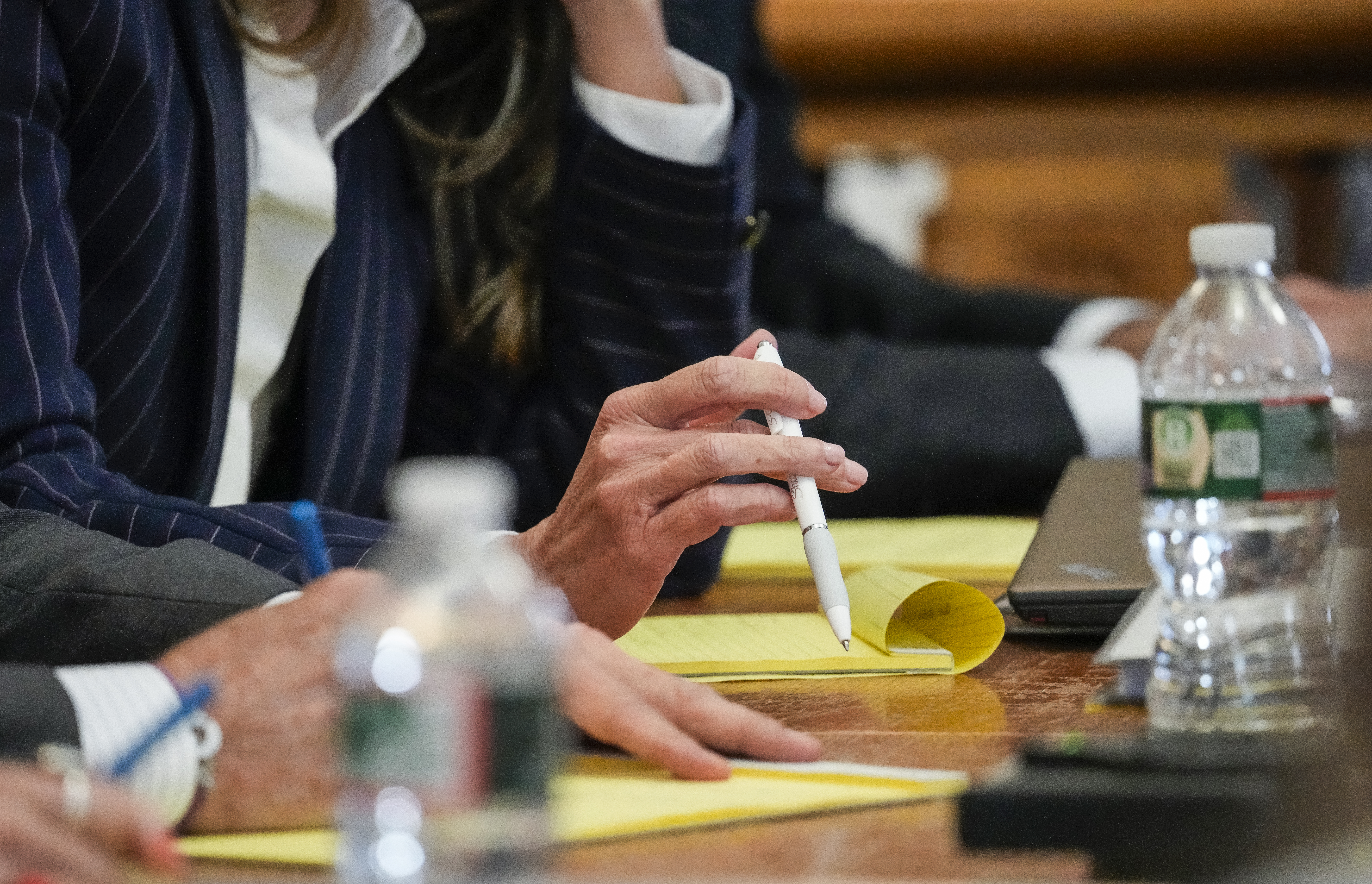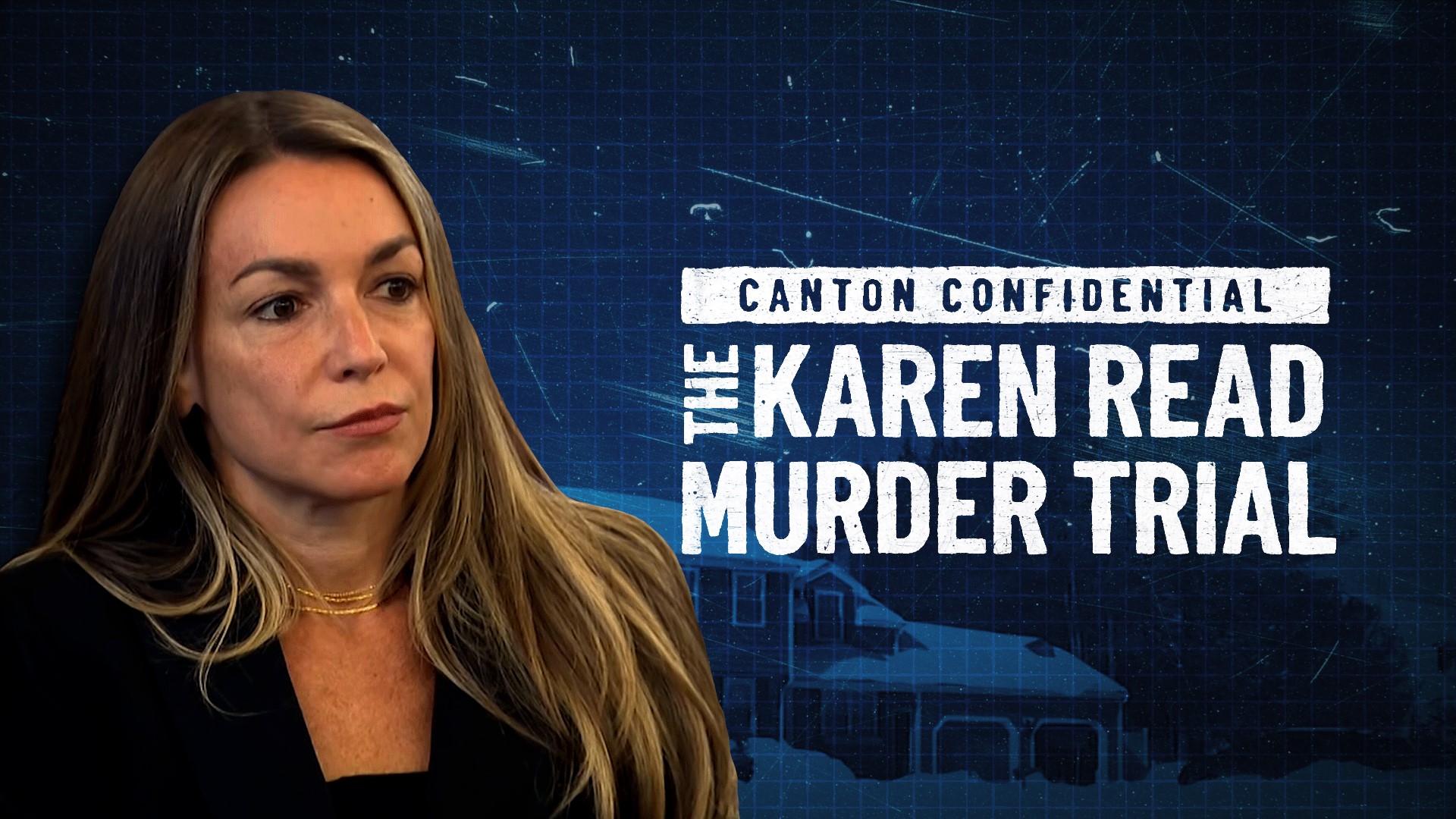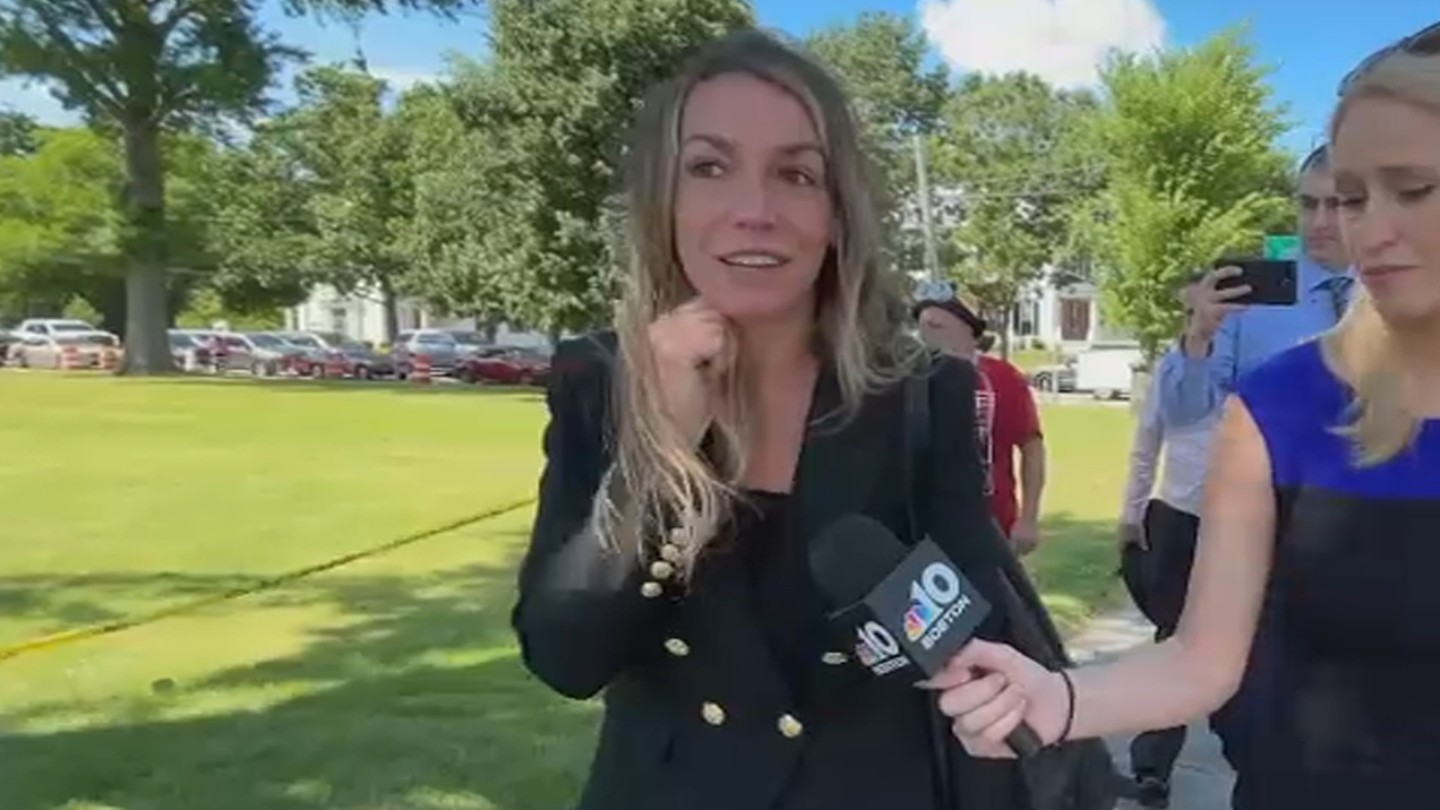Controversial testimony continued Monday morning when the Karen Read trial resumed.
The final witness of the day - Massachusetts State Police Trooper Nicholas Guarino, discussed messages extracted from the phones of Karen Read and John O'Keefe. Those messages reveal that the couple was fighting over the state of their relationship on Jan. 28 and suggesting that it was not the first time.
WATCH ANYTIME FOR FREE
>Stream NBC10 Boston news for free, 24/7, wherever you are. |
The last person to take the stand Friday was also the first to testify Monday -- that's Trooper Joseph Paul, a crash reconstruction expert with Massachusetts State Police. His early testimony caused some tension in the courtroom.
He answered questions during a heated cross examination Friday about what he makes of a controversial video showing Read backing into John O'Keefe's vehicle, which was parked at her home.
Get updates on what's happening in Boston to your inbox. Sign up for our >News Headlines newsletter.
The defense says that's what caused her taillight to crack, adding that police had something to do with O'Keefe's death and then framing Read for murder.
The prosecution argues that Read's SUV was damaged after she backed it into O'Keefe, her Boston police officer boyfriend, on Fairview Road in Canton, Massachusetts, leaving him for dead in a snowbank outside the home of a fellow officer in the early hours of Jan. 29, 2022 after a night of drinking.
Read has pleaded not guilty, and her defense team argues she is being framed.
Trooper Paul explained Friday why he believes the potential collision in the video could not have damaged Read's SUV as the defense says.
“So if the taillight breaks it should leave some sort of scratching, maybe a dent, some sort of damage to the vehicle should have occurred.”
Read's defense pointed out the trooper never did a test where he backed a Lexus against a Traverse and said he "misread almost every piece of data collected in the investigation."
That happened without the jury there, as Judge Beverly Cannone asked for a preview of this new testimony, but Paul will be back on the stand Monday morning.
Massachusetts State Police Trooper Joseph Paul continues his testimony
Paul was the first witness on Monday, resuming his testimony from Friday. He began by answering several questions from Assistant District Attorney Adam Lally about how he believed O'Keefe was killed.
Lally finished his questioning shortly before 9:30 a.m. and defense attorney Alan Jackson began cross examining the witness.
Jackson asked who it was who assigned the case to Paul and who briefed him on the case. Paul said he was given a summary by a crime scene photographer he knew who was at the scene.
The defense also asked Paul how he knows when the scratches on Read's car happened, noting that there are many ways in which a car can get dinged or scratched. Jackson asked if it was possible that all the scratches on the SUV happened before Jan. 29, 2022, Paul said it was not possible.
On several occasions, Jackson accused Paul of being evasive, including one exchange where Jackson was trying to ask how he learned about the events of Jan. 29, 2022.
"The crime scene talked to you," Jackson said to Paul at one point, incredulous.
"Yes," Paul said.
"DId the crime scene tell you anything else?" Jackson replied.
Jackson also asked Paul about several elements of his report, including how far O'Keefe's body was found and how many pieces of plastic were found and where. He also asked about how Paul determined where O'Keefe's body was, and if that measurement was off, if every other measurement in the report would be off.
"Hypothetically," Paul replied.
Jackson also pointed out that Paul described the incident leading to O'Keefe's injuries on Friday as a "U-turn," but Paul clarified Monday that it was in fact a "three-point turn."
"Those are two very different maneuvers, you agree?" Jackson asked.
"I was trying to say... it was a U-turn. It's a three-point turn... they're still making a U-turn. She was turning around."
Jackson also sought to challenge Paul's expertise, asking about the calculations he used in his report to determine how far O'Keefe's body moved after being hit by a vehicle.
At one point he asked Paul to confirm his calculation.
"No, because the vehicle is too heavy and the body too light," Paul said.
"Where'd you learn that?" Jackson asked.
"It's in my math," Paul replied.
Jackson asked if Paul was formally trained in physics, kinematics or biomechanics. Paul said he was not, but many aspects of those fields of study were included in his accident reconstruction classes.
"Exactly how was that taillight shattered? Explain it to us," Jackson asked.
"The tailight in this case was shattered when it struck John O'Keefe's arm... based on what I saw of his injuries, it was from his upper part of his arm down," Paul said.
"Did you account for the fact that his arm is on a hinge? His shoulder?" Jackson asked, referencing the fact that Paul's report said O'Keefe flew 30 feet after being struck.
He also asked how Paul could account for the fact that he didn't break his arm or even suffer a bruise.
On redirect, Lally asked Paul to again explain why he believes O'Keefe's injuries are consistent with being struck by a vehicle. He explained that his experience as an accident reconstruction expert, roadway evidence and witness statements all led him to that conclusion, including Read's own admission that she performed a three-point turn before leaving the scene.
"Based on the evidence from the vehicle, based on the injuries to John O'Keefe, the taillight appears to be broken into sharp plastic pieces that could have ripped his arm," Paul said, "and also the dent with the scratches above it is consistent with a hand holding a glass and the glass on top smashing on the vehicle and the hand smashing the vehicle."
Paul concluded his testimony just before noon.
Digital intelligence expert takes the stand
Just before 12:15 p.m., Ian Whiffin, a coding project manager with Cellebrite, a widely-used phone extraction tool, took the stand.
He began by testifying about how his company provides forensic support to law enforcement, and how he became involved with the case. He testified about a specific report related to a data extraction performed on Jennifer McCabe's phone and several elements that he said were deleted from the phone.
He was specifically asked by Lally about a document highlighting a list of search terms found on McCabe's phone and the method of searching. The report included the following three search terms:
- bpd & john okeefe
- hos long to die in cold
- how long ti die in clkd
None of the searches were conducted in private browsing mode, Whiffin testified.
He said the searches were conducted at 6:23 and 6:24 a.m., but he doesn't believe based on the data that the searches ever successfully loaded. Read's defense team has maintained that the searches were conducted closer to 2:27 a.m., hours before O'Keefe's body was found.
Whiffin returned to the stand following the lunch break around 1:45 p.m., continuing his testimony about McCabe's Google searches. These included searches for Eastern Bank, the song "It's Raining Men," by The Weather Girls, a family portal for Canton High School, a competitive basketball program and what appeared to be a meal-preparation service.
Messages pulled from Read's phone reveal she and O'Keefe fought
Massachusetts State Police forensic expert Trooper Nicholas Guarino took the stand next.
The first part of his testimony focused on explaining how investigators tried to pull data from Read’s vehicle, the tools used, and some of the challenges they faced with the compatibility of their investigative technology with her make and model. Then the conversation turned to a discussion of phone records.
Guarino was involved in extracting and reviewing data from four of the cell phones involved in the case – the ones belonging to Read, O’Keefe, and Jennifer McCabe and Kerry Roberts. He spoke extensively about data on McCabe’s phone, referencing a report from a defense team expert and calling it “mostly incorrect.”
He also discussed the question of the search which the defense has attempted to establish was made at 2:27 p.m. The defense says McCabe did the search at 2:27 a.m. – long before the prosecution says O’Keefe was found and first responders were called - because she and others knew O’Keefe was lying in the snow.
Guarino testified that the timestamp was pulled from a collection of data that does not typically reveal search history. He also questioned the defense expert’s assertions that McCabe deleted call log information from her phone, saying the files that had been deleted were in a section of the phone that the device automatically clears over time, and wouldn’t have been accessible for the user to delete.
But arguably the most significant part of Guarino’s testimony came when Guarino was asked to read from a series of Facebook messenger messages between Read and O’Keefe, starting in the afternoon on January 28, 2022. In them, the couple appears to be discussing a fight they had earlier in the morning.
“I feel pretty sh---y about how this morning when down,” Read wrote. I know you said sorry but it really stung. Esp when I’ve been trying pretty hard lately. I feel like a loser turning around and just coming back over after everything you said,” Read wrote at 2:16 p.m.
“Not sure what else you want me to do. I said I’m sorry and I was outta line. If you prefer to stay home I totally get it,” O’Keefe responded at 2:17 p.m
The exchange continued and gets heated, with Read pressing O’Keefe to tell her if he was interested in something else.
O’Keefe denies being interested in anyone else, adding, “Things haven’t been great between us for awhile. Ever consider that?” at 2:26 p.m.
Phone records show Read attempted to call O’Keefe multiple times in that timeframe, despite multiple messages from O’Keefe telling her not to call, and that he was not going to pick up. According to Guarino’s testimony on the phone records, there were 18 calls from Read to O’Keefe between 9:19 a.m. and 2:59 p.m. - 11 of them were rejected, four were missed, and three were answered. At around 3 p.m., O’Keefe calls Read back.
The conversation moved to other topics, including the impending blizzard, later in the evening. The last of the messages Gurino read were sent by Read to O’Keefe.
“I’m going home,” she wrote at 12:55 a.m. on January 29.
“See u later,” she writes immediately after.
The last two messages come through shortly after.
“Your kids are (expletive) ALONE,” she wrote at 1:02 a.m.
“Im back in Mansfield. The kids are home alone,” her final message, sent at 1:04 a.m.
The prosecution begins to start a line of questioning with Guarino about other data extracted from Read’s phone, including phone calls and message between Read and Jennifer McCabe, but it was cut short by the judge, who opted to send jurors home for the day as Lally appeared to pour over his evidence.
Why was the courtroom feed temporarily off Friday?
It was a bit chaotic in the courtroom Friday morning.
Court proceedings were halted by Judge Cannone soon after getting underway Friday. Before any testimony occurred, a sidebar was called, and a juror joined the sidebar. Cannone was seen having a discussion with the juror, and when the sidebar ended, the judge said that cameras must be shut off for the rest of the morning. The court then went into recess around 9:20 a.m.
NBC10 Boston analyst and commentator Sue O'Connell, who was in the courtroom, said apparently the pool camera was on a wide shot when the court officers escorted the juror into the courtroom, so the juror was shown on camera.
Court proceedings resumed around 9:45 a.m. with the camera off. Another juror entered the courtroom for a sidebar.
The day's testimony began shortly after 10:30 a.m., with the news that a juror had been excused. Another juror was already excused from the case earlier last week. The jury now consists of 15 people -- nine women and six men.
Initially, only an audio feed was provided at the start of the day's testimony, but around 11 a.m. a court-supplied video feed resumed. The pool camera returned in the early afternoon.
This week's trial schedule
The trial is expected to be in session full days on Monday and Thursday this week, with a half day on Friday, June 21. There will be no session on Wednesday to mark the Juneteenth holiday. Judge Cannone said that on Tuesday she and the attorneys will meet for voir dire on four potential defense witnesses. The jury will not be present to hear from any witnesses that day.




